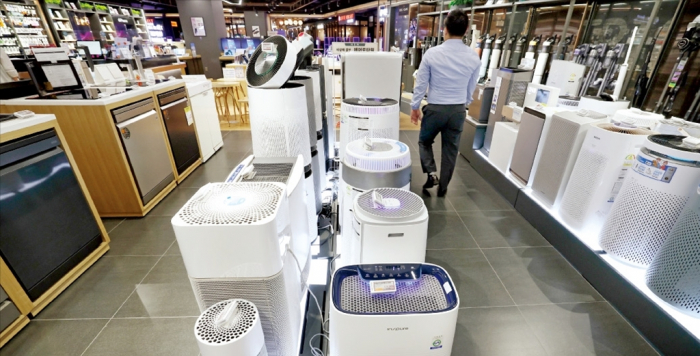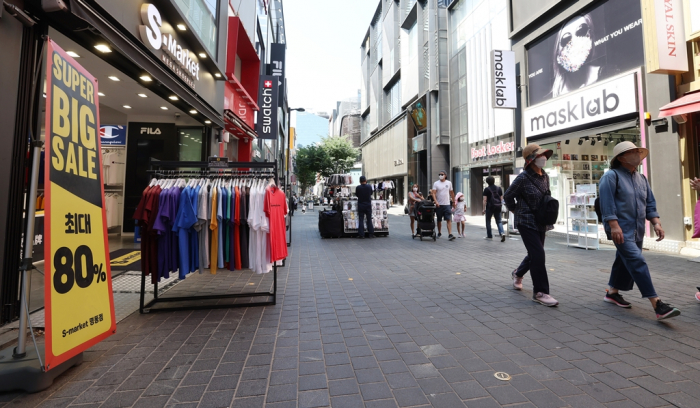Economy
Korea faces risk from record $114 bn in inventory assets
Samsung Electronics’ inventory assets surge 55.4% as of end-Q1; those of SK Hynix, LG Electronics soar 68.1%, 27.7%, respectively
By Jul 06, 2022 (Gmt+09:00)
4
Min read
Most Read
LG Chem to sell water filter business to Glenwood PE for $692 million


Kyobo Life poised to buy Japan’s SBI Group-owned savings bank


KT&G eyes overseas M&A after rejecting activist fund's offer


StockX in merger talks with Naver’s online reseller Kream


Mirae Asset to be named Korea Post’s core real estate fund operator



South Korea’s major listed companies held record inventory assets as they piled up raw materials to deal with the global supply chain disruption despite weakening consumption amid accelerating inflation.
The assets in stock are expected to hurt corporate earnings and investment with the increasing risk of a global economic recession, analysts said.
“Inventories are accumulating as spending is sharply falling, especially on durable goods,” said Joo Won, a senior economist at Hyundai Research Institute. “The inventory assets are likely to put pressure on corporate profits and investor sentiment.”
The country’s top 30 companies by market capitalization such as Samsung Electronics Co., LG Energy Solution Ltd., SK Hynix Inc. and Hyundai Motor Co., excluding financial firms and holding firms, possessed a record-high 148.4 trillion won ($114 billion) worth of inventory assets in total as of March 31, according to the Financial Supervisory Service and Korea Investors Service Inc., an affiliate of Moody’s Investors Service on Wednesday. The combined value of the inventory assets was up 39.2% from a year earlier.
Ample inventory assets help companies deal with increasing demand when the economy booms but exacerbate a slowdown when the economy weakens.
South Korean companies had raised inventory assets, scrambling for raw materials and parts amid surging commodity prices as well as global supply chain disruption. Those firms, especially electronics makers, had also manufactured more products on hopes of sustained “revenge shopping,” a post-lockdown rush to purchase durable goods.
But customers have tightened the purse strings given accelerating inflation and rising household debt. Consumer prices in Asia’s fourth-largest economy grew 6% in June from a year earlier, the fastest pace since November 1998 when South Korea was hit by the Asian financial crisis. Inflation is expected to remain high for the time being, which will likely hurt domestic demand.
Weaker consumption is expected to cut companies' production, investment and employment, given their record inventories, analysts said. Lower corporate investment and employment could dent consumer spending even more.
SEMICONDUCTOR, ELECTRONICS SECTORS
Inventory asset growth in the semiconductor and electronics industries was outstanding as surging inflation further cut purchasing power and demand for durable goods.
Samsung’s inventory assets jumped 55.4% to 47.6 trillion won as of the end of March from a year earlier, while those of SK Hynix and LG Electronics soared 68.1% and 27.7%, respectively, to 10.4 trillion won and 10.2 trillion won during the period.
That came as customers suffered sticker shock -- the dismay experienced on seeing a product's unexpectedly high price – rather than purchasing expensive items such as TVs, according to Hyundai Research Institute.
Few customers were seen at a six-story store of Lotte Himart, the country’s top electronics retailer, in Seoul last Sunday even as it was in the peak of the summer season.
“Customers spent more on home appliances during COVID-19 but we have a completely different situation now,” said an official at the store. “We are falling off the cliff, I feel, because of weak sales.”
The subsidiary of the country’s leading department and discount store operator Lotte Shopping Co. reported 8.2 billion in operating losses during the first quarter after its first deficit of 2.9 billion won in the previous three months.

TO POSTPONE NEW PRODUCT LAUNCHES, CUT INVESTMENT
Rising inventories forced some electronics makers to delay launches of new products as assets in stock are expected to increase further.
Industry tracker Omdia has recently slashed its forecast for global TV shipments by 1.3% to 208.8 million units from the previous prediction.
Active reduction in inventories often weakens corporate earnings as companies usually need to cut prices to sell products in stock. Values of unsold old models decline as time goes by, resulting in inventory valuation losses and hurting operating and net profits.
“We have no choice but to cut prices in order to defend market share although we know we are losing money,” said a senior executive at a major electronics producer. “It would be hard to report healthy earnings this year as we also have other issues such as rising commodity prices and a logistics crisis.”
Investment sentiment among companies also soured. A survey of 100 local companies among the top 500 firms by sales by the Federation of Korean Industries (FKI), a business lobby group, showed 28% of the participants planned to cut investment in the second half.
The Bank of Korea expected capital expenditures this year to fall 1.5% in its economic forecast published in May, reversing its February prediction of 2.2% growth.
Write to Ik-Hwan Kim and Shin-Young Park at lovepen@hankyung.com
Jongwoo Cheon edited this article.
More to Read
-

-
 EconomyKorea sees record H1 trade deficit, weak consumer sentiment
EconomyKorea sees record H1 trade deficit, weak consumer sentimentJul 01, 2022 (Gmt+09:00)
5 Min read
Comment 0
LOG IN


